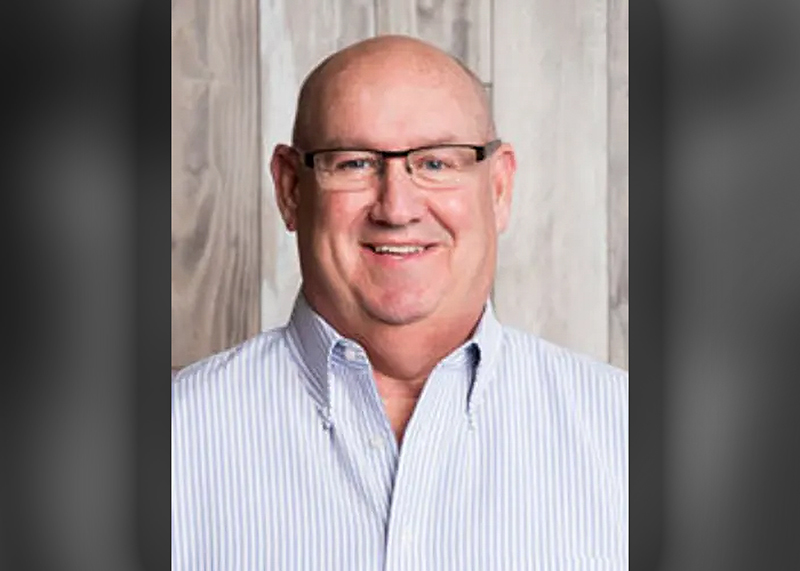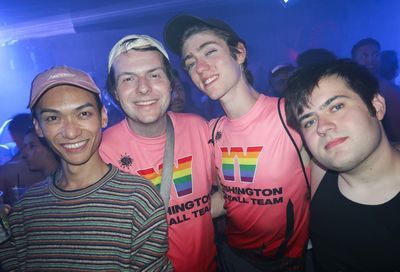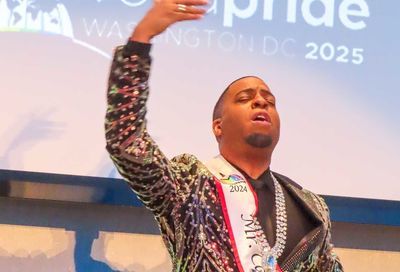The Sunday Sessions offers a compelling, unsettling close-up of conversion therapy
Richard Yeagley's new documentary provides a behind-the-scenes look at "ex-gay" talk therapy.

Richard Yeagley calls his latest film a “tragic tale” of one man’s journey through conversion therapy. The Sunday Sessions, produced and directed by the local filmmaker, focuses on Nathan, a devout Catholic in his late 20s from Front Royal, Va., who is severely conflicted about his feelings of same-sex attraction.
The film follows Nathan as he seeks treatment from Christopher Doyle, a therapist and self-described former homosexual, best known for founding the International Healing Foundation, which promotes conversion therapy. The documentary follows Nathan’s sessions with Doyle, as well as his relationships with his parents and his sisters, his acting work in local college theater productions, his interactions with fellow clients of Doyle who are also struggling with same-sex attraction, and his relationship with an out gay friend named Cameron, who is skeptical of Doyle’s methods and the efficacy of the therapy that Nathan is receiving.
“[Nathan has] made his decision to continue to live and try to, I guess, remain celibate and repress his sexual feelings, and that’s the tragedy of it all,” says the Baltimore-based Yeagley. “I feel he’s bitter about everything…. He knows his decision is bullshit, but for whatever reason, religious dogma, religious ideology, his conservative Catholicism has won the day and has gotten the best of his heart and his head.”
It’s that choice to move forward with what Yeagley calls a “lie” — that Nathan is capable of changing his orientation and suppressing his desires — that many viewers may find unsettling. But it’s also what separates The Sunday Sessions from other recent, narrative films focusing on conversion therapy, such as Boy Erased or The Miseducation of Cameron Post, where audiences at least assume there will be a positive resolution to the protagonist’s struggle.
Another difference is that Yeagley, who has since become a skeptic of conversion therapy, doesn’t approach his film with the same heavy-handed messaging present in many “advocacy” films like Michael Moore’s Bowling for Columbine, which took on the gun lobby, or Davis Guggenheim’s An Inconvenient Truth, which warns viewers of the dangers of climate change. Instead, he calls The Sunday Sessions “completely observational.”

“The editorializing only comes in the form of the choices I make and what scenes I decide to show. I don’t want to come at it with a heavy hand of, ‘You need to think this,'” he says. “I think the footage speaks for itself in that adhering to this kind of archaic philosophy of ‘Homosexuality is a sin’…is ultimately a waste of time for anyone. I think the main takeaway is that pushing this ideology, this idea of there is something wrong and it needs to be fixed, is fundamentally unsound, but that’s what conversion therapy enforces.”
The idea for The Sunday Sessions was sparked by a 2014 article in The Baltimore Sun chronicling Doyle’s fight against a proposed ban on youth conversion therapy in Washington, D.C. Although Yeagley had heard his sister, a member of the LGBTQ community, mention conversion therapy a number of years earlier, the concept didn’t stick.
“It was an ‘out of sight, out of mind’ kind of thing,” he says. “I live in Baltimore City, in a pretty progressive area. My whole family is affirming, and my sister has never had to deal with any type of oppression or rejection from family members. So my first thought when I read the article was, ‘Holy shit. This exists?'”
Yeagley believed that documenting a person’s journey through conversion therapy, and their struggle to reconcile their feelings, would make for compelling cinema.
“I am not religious, but seeing that struggle and seeing the convictions some people have to their ideologies and dogmas is a very fascinating topic,” he says. “That, just on a psychological level, was what drew me to the kind of inherent drama that I assumed would be part of the story.”
Yeagley reached out to Chris Doyle directly and asked if there were any patients he could shadow.
“The number one thing he asked me was what my sexual orientation was,” recalls Yeagley. “Once I told him I was straight, he seemed to be totally amenable to entertaining the idea of having me shoot.”
While Doyle didn’t outright reject the offer, he did tell Yeagley that it was unlikely any of his patients would allow themselves or their sessions to be filmed, because many feel a great degree of shame about their sexuality. But a week later, Doyle contacted Yeagley to tell him that Nathan had agreed to participate. The three men spoke on Skype, Yeagley pitched his ideas for the film, and Nathan and Doyle agreed — provided he didn’t interfere with the content of the sessions.
“From there, it was just maintaining the relationship, trying to remain as unobtrusive as possible, and just remaining curious,” Yeagley says.
Most of the film’s action takes place in Nathan’s therapy sessions, where he is shown crying, shaking, ranting, and throwing ripped-up pages of books at inanimate objects that represent people in his life who have undermined his masculinity. The sessions — where viewers can almost see the physical manifestations of Nathan’s internal struggle — are some of the most raw, poignant, and striking scenes in the film, but also some of the most difficult to watch.
“It’s tough because it is unsettling,” Yeagley says. “It kind of needs to come with a trigger warning, ‘Look, if you haven’t dealt with these issues of coming out, then…’ It’s unsettling to see a man completely unraveling and questioning himself constantly. Filming it was emotionally taxing.”
From Yeagley’s perspective, the Nathan that viewers are introduced to at the beginning of the film is the truest version of his subject.
“When he is his true self, he’s a very intellectual guy, but he’s not so pompous, and he also can be very artistic. That is the version that he becomes when he’s with his friend Cameron. That’s the most perfect version of Nathan, and that’s the version that he’s actually trying to suppress and repress, sadly,” says Yeagley, who notes that Nathan has since severed ties with Cameron and, as of last week, hadn’t talked to him in at least three years.
“That’s part of the cult-like element that exists within this type of therapy. It’s like, ‘Hey, these people don’t agree with us. You have to shut them out from your life. Any dissenting opinion needs to be gone, and he is gay-affirming. That’s a problem.’
“I went into this story not knowing what the outcome would be, but hoping Nathan would denounce this ‘therapy,’ separate himself from Chris Doyle, get back with his quasi-boyfriend Cameron, and live happily ever after. The humanist in me wants that expression at the end. Obviously, that did not happen.”
Yeagley also realizes that, had he intervened to comfort or console Nathan, he not only would have broken the fourth wall and lost access to the therapy sessions, but increased Nathan’s resolve to continue the therapy.
“The more you try to tell Nathan what to do, the more he’s going to go against what you’re saying,” Yeagley says. “That’s his personality. He would’ve been so turned off by it and probably would’ve put his foot on the pedal and gone even harder.”
After watching Nathan’s struggle, Yeagley believes that “talk therapy,” like the kind provided by Doyle, can be just as emotionally and psychologically harmful as more extreme conversion therapy techniques, such as electroshock therapy or forced vomiting.
“The whole basis of conversion therapy, and even just talk therapy, is ‘you’re ashamed to be gay, and you need to be changed, and I have a solution to try to change that,'” he says.
Yeagley finds one exchange between Doyle and Nathan to be particularly noteworthy. During a therapy session, Doyle admits that, even after undergoing therapy, Nathan will continue to struggle with same-sex attraction for the rest of his life.
“It was such a shocking moment to me,” says Yeagley. “He says, ‘You will never rid yourself of your same-sex attractions. It will always be there.’ Basically, it is the admission of ‘you’re never going to be straight. You can control your behavior and not act out on the guy that you find attractive or the boyfriend that you want to start dating, but that’s all you can hope for.'”
He continues: “I feel that was one of the more important moments in the film. It’s almost an admission on his part that you will not be able to convert your sexual orientation. You’re selling this therapy as converting someone, and you know you can’t. I find that it’s also kind of interesting, because so many of these ‘ex-gay’ conversion therapists of the past are now coming out, and saying, ‘This is completely B.S.'”
The Sunday Sessions screens on Sunday, Feb. 17 at Creative Alliance, 3134 Eastern Ave., Baltimore, MD. For more information on tickets, or to stream or buy the film, visit www.thesundaysessionsmovie.com.
Support Metro Weekly’s Journalism
These are challenging times for news organizations. And yet it’s crucial we stay active and provide vital resources and information to both our local readers and the world. So won’t you please take a moment and consider supporting Metro Weekly with a membership? For as little as $5 a month, you can help ensure Metro Weekly magazine and MetroWeekly.com remain free, viable resources as we provide the best, most diverse, culturally-resonant LGBTQ coverage in both the D.C. region and around the world. Memberships come with exclusive perks and discounts, your own personal digital delivery of each week’s magazine (and an archive), access to our Member's Lounge when it launches this fall, and exclusive members-only items like Metro Weekly Membership Mugs and Tote Bags! Check out all our membership levels here and please join us today!
























You must be logged in to post a comment.